A Dinner Honoring the 2009 Recipients of the National Medal of Arts and National Humanities Medal
Title
Date
Contributor
Summary
This document is a program booklet for an inaugural dinner held on February 24, 2010, at the Smithsonian National Museum of American History in Washington, D.C. The event honored the 2009 recipients of the National Medal of Arts and the National Humanities Medal. The booklet includes a welcome message from the Co-Chairmen of the President's Committee on the Arts and the Humanities, George Stevens, Jr. and Margo Lion, and outlines the evening's program, featuring toasts, a keynote address by Tony Kushner, and concluding remarks by Mary Schmidt Campbell. Detailed biographies of all 2009 medalists are provided, highlighting their significant contributions across various artistic and humanistic fields. The document also includes a dinner menu and an essay, "The Case for the Arts and Humanities," by Iowa Poet Laureate Marvin Bell, underscoring the importance of these fields to the nation.
More Sources Like This
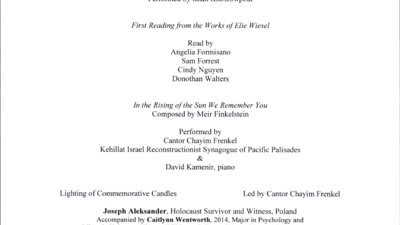
This document is a program for an 'Evening of Holocaust Remembrance' held at Chapman University. The event, which took place in April 2015, features a multi-faceted commemoration including musical performances of works by George Enescu, Meir Finkelstein, George Rochberg, and Ilse Weber. Readings from the works of Elie Wiesel are also presented. A significant portion of the program is dedicated to personal testimonies from Holocaust survivors and a second-generation participant from various countries, accompanied by students and educators. The program concludes with a candle-lighting ceremony led by a cantor and reflections by university deans and directors. The event aims to honor the memory of the Holocaust through art, personal stories, and educational outreach.
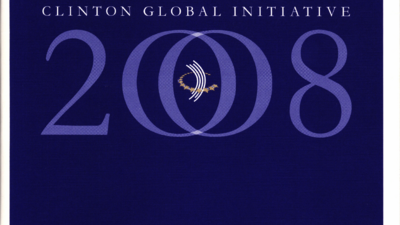
This document is an invitation and program guide for the Clinton Global Initiative (CGI) Annual Meeting, which took place in New York City from September 24-26, 2008. The invitation letter, dated July 2, 2008, is personally signed by Bill Clinton and addresses Professor Elie Wiesel, inviting him to participate. The meeting aims to convene influential global leaders, including heads of state, business executives, non-profit directors, and faith leaders, to collaborate on actionable solutions for pressing global challenges. Key focus areas highlighted are energy and climate change, poverty alleviation, global health, and education. The document outlines CGI's unique approach, which includes plenary and working group sessions, fostering commitments to action, providing ongoing support, and recognizing achievements. It also lists many prominent individuals who have previously participated in the initiative and details the impressive impact of CGI's efforts in improving lives worldwide. A membership form is included for those wishing to join.
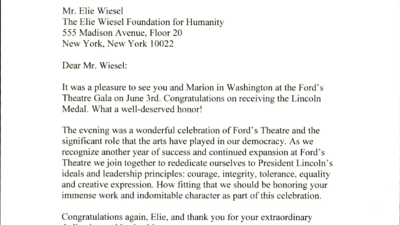
Nancy Pelosi writes to Elie Wiesel to congratulate him on receiving the Lincoln Medal at the Ford's Theatre Gala on June 3rd, 2012. She describes the evening as a wonderful celebration of Ford's Theatre and its role in democracy. Pelosi notes the collective rededication to President Lincoln's ideals and leadership principles of courage, integrity, tolerance, equality, and creative expression. She concludes by expressing gratitude for Wiesel's extraordinary dedication and leadership.
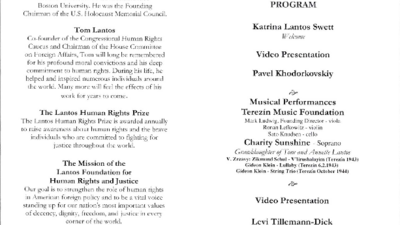
This document is the program for the 2010 Tom Lantos Human Rights Prize Award Ceremony, held on Wednesday, November 17, 2010, at Tishman Auditorium, The New School, New York, NY. The ceremony honored Elie Wiesel as the recipient of the prize. The program includes a welcome by Katrina Lantos Swett, video presentations, and musical performances by the Terezín Music Foundation, Charity Sunshine, and Levi Tillemann-Dick. Governor Bill Richardson presented the award, which Elie Wiesel accepted. The program provides biographies of Elie Wiesel and Tom Lantos, details the mission of the Lantos Foundation for Human Rights and Justice, and acknowledges various contributors, including founding humanitarians and those involved in video and photographic content. It also lists the Board of Trustees of the Lantos Foundation.
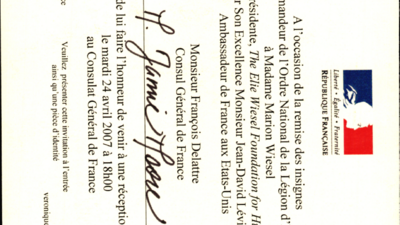
This document is an invitation from the French Consulate General in New York, addressed to H. Jamie Hoore. It invites the recipient to a reception and award ceremony on Tuesday, April 24, 2007, at 6:00 PM, at the Consulate General of France, located at 934 Fifth Avenue, New York. The event is held on the occasion of the presentation of the insignia of Commander of the National Order of the Legion of Honor to Madame Marion Wiesel, Vice-President of The Elie Wiesel Foundation for Humanity. The award will be presented by His Excellency Monsieur Jean-David Lévitte, Ambassador of France to the United States. Monsieur François Delattre, Consul General of France, extends the invitation. Attendees are requested to present the invitation and a form of identification for entry. RSVP contact details are provided.
of
Gertrude Hallo
Dr. Gertrude Hallo, nee Rubensohn, was a personal friend of Franz Rosenzweig. She talks about her and her husband’s association and personal relationship with Franz Rosenzweig, starting in 1910 through his final illness, when she learned to take dictation from Franz Rosenzweig who could only move part of one little finger. She explains why Franz Rosenzweig decided not to convert to Christianity but to devote his life to personal Jewish learning, and to improving Jewish education for children and adults. He strove to combine orthodox practice with liberal thought. She explains why one should focus on the man and his life, not on his philosophical system and his theological teachings.
Dr. Hallo talks about Rosenzweig’s life, work, major accomplishments, publications, and some of the well-known persons who studied with him. She describes how he was able to live and to teach after he was stricken with Amyotrophic Lateral Sclerosis. Franz Rosenzweig kept up an enormous correspondence, continued to write, publish and to translate Hebrew books into German until his death on December 9, 1929.
Dr. Hallo uses the historical background in Germany, the Jewish youth movement, Zionism, and the beginning of the racist Teutonic movement to explain why young Jews had to fight for their Jewish identity in Germany in the 1920s. She briefly talks about the Freikorps, the Kapp Putsch, and the economic, social, and political situation in Germany leading up to the rise of Hitler.
She reflects on Jewish participation in German art and culture and her own early experiences of antisemitism. Her husband died shortly before Hitler came to power, and she talks about her memories of the time just before and after Hitler’s rise to power and the basis of Hitler’s charisma and success.
See also her 1978 interview.
Note: the Collateral Material fileavailable through the Gratz College Tuttleman Library includes:
English translation (done in Nov. 1985) by Dr. Hallo of an article by her husband Dr. Rudolf Hallo “The Pasalter” dedicated to Franz Rosenzweig.